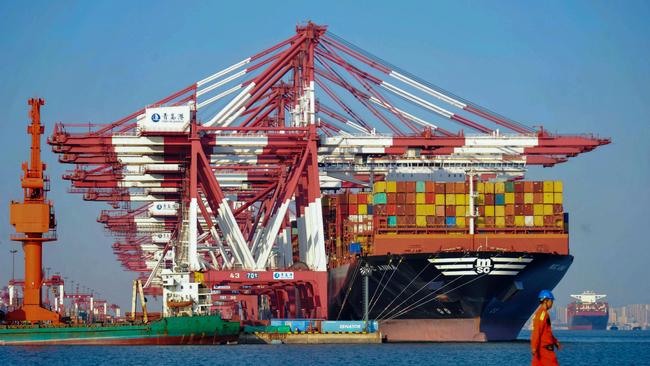China considers joining TPP as a counter to Trump trade war
China could look at joining Australia and 10 other countries in the Trans Pacific Partnership agreement.

China could look at joining Australia and 10 other countries in the Trans-Pacific Partnership agreement as it seeks to counter the impact of Donald Trump’s anti-China trade push.
The South China Morning Post reported yesterday that China was rethinking its views towards the revised TPP which was signed by 11 countries, including Australia, in March despite the Trump administration pulling the US out of the deal.
While China originally had no interest in joining the TPP, the Post said Chinese officials were rethinking their strategy with the possibility of joining the regional trade oact as a counter to Mr Trump. As well as increasing its anti-Chinese trade measures, the US has forced its two North American trade partners — Canada and Mexico — to agree to a possible veto of any trade deal they make with Beijing.
Now called the Comprehensive and Progressive Agreement for Trans-Pacific Partnership (CPTPP), the 11-nation deal comprises Australia, Brunei, Canada, Chile, Japan, Malaysia, Mexico, New Zealand, Peru, Singapore and Vietnam. They make up 13.5 per cent of global gross domestic product.
Wang Huiyao, director of Beijing-based think tank the Centre for China and Globalisation, told the Post that joining the CPTPP could send a strong message to the world that China was serious about further opening up its economy. “Joining the CPTPP could become a tool to hedge against the US and help China establish a new trade circle in addition to the Belt and Road Initiative and the Shanghai Co-operation Organisation,” he said.
Japanese Prime Minister Shinzo Abe, who took the lead in reviving the TPP in the wake of the US withdrawal, is due to visit Beijing for talks later this month.
The reports of potential Chinese interest in CPTPP came as the US announced plans to step up controls on civilian nuclear exports to China over concerns that they could be used for military purposes. “The United States cannot ignore the national security implications of China’s efforts to obtain nuclear technology outside of established processes of US-China civil nuclear co-operation,” US Energy Secretary Rick Perry said.
China is a growing market for new nuclear power plants as it looks for ways to meet its demand for electricity while reducing its reliance on coal- fired plants.
The US Energy Department said it would not be banning exports of nuclear-power-related technology to China but warned that there would now be a “presumption of denial” for any new licences for the sale of technology to China’s state-owned China Nuclear Power Corporation.
The US ships $US170 million worth of nuclear exports to China, the second-largest market for US exporters in the sector after Britain.
The company was indicted last year on charges of conspiring to develop sensitive nuclear material with US know-how without going through the required approval process.
Mr Trump and officials in his administration have launched a tirade of attacks against China, with tariffs of between 10 and 25 per cent on $US250 billion worth of Chinese exports to the US. But Chinese Commerce Ministry spokesman Gao Feng said China was still open to resuming trade talks, arguing that the two countries should shift their focus towards making the economic pie bigger for the benefit of both sides.
There have also been reports from Washington that Chinese President Xi Jinping and Mr Trump could meet on the sidelines of the G20 meeting in Buenos Aires late next month, which could provide an opportunity for some breakthrough in negotiations. The Wall Street Journal reported yesterday that the Trump administration had privately given Chinese officials the go-ahead for a meeting.
It appears the Trump administration is divided into two camps: a moderate one led by Treasury Secretary Steve Mnuchin and National Economic Council director Larry Kudlow who are worried that the concerns about the trade wars are now hitting global stockmarkets; and a more hawkish side led by National Trade Adviser Peter Navarro and US Trade Representative Robert Lighthizer.
The US Treasury is understood to have decided China is not manipulating its currency in a report due to be released next week.



